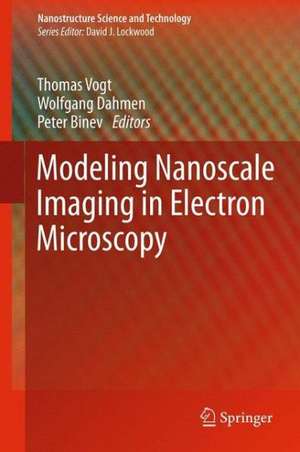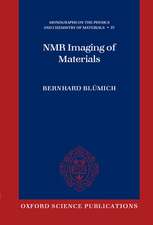Modeling Nanoscale Imaging in Electron Microscopy: Nanostructure Science and Technology
Editat de Thomas Vogt, Wolfgang Dahmen, Peter Bineven Limba Engleză Paperback – 13 apr 2014
| Toate formatele și edițiile | Preț | Express |
|---|---|---|
| Paperback (1) | 635.96 lei 6-8 săpt. | |
| Springer – 13 apr 2014 | 635.96 lei 6-8 săpt. | |
| Hardback (1) | 640.06 lei 6-8 săpt. | |
| Springer – 2 mar 2012 | 640.06 lei 6-8 săpt. |
Din seria Nanostructure Science and Technology
- 18%
 Preț: 1114.65 lei
Preț: 1114.65 lei - 18%
 Preț: 1001.02 lei
Preț: 1001.02 lei - 24%
 Preț: 834.59 lei
Preț: 834.59 lei -
 Preț: 405.66 lei
Preț: 405.66 lei -
 Preț: 405.28 lei
Preț: 405.28 lei - 18%
 Preț: 947.35 lei
Preț: 947.35 lei - 18%
 Preț: 734.27 lei
Preț: 734.27 lei - 15%
 Preț: 696.02 lei
Preț: 696.02 lei - 20%
 Preț: 585.30 lei
Preț: 585.30 lei - 20%
 Preț: 556.90 lei
Preț: 556.90 lei - 15%
 Preț: 646.62 lei
Preț: 646.62 lei - 18%
 Preț: 947.50 lei
Preț: 947.50 lei -
 Preț: 397.97 lei
Preț: 397.97 lei -
 Preț: 406.05 lei
Preț: 406.05 lei - 18%
 Preț: 967.08 lei
Preț: 967.08 lei - 18%
 Preț: 947.50 lei
Preț: 947.50 lei - 18%
 Preț: 948.29 lei
Preț: 948.29 lei - 18%
 Preț: 950.03 lei
Preț: 950.03 lei - 18%
 Preț: 951.29 lei
Preț: 951.29 lei - 18%
 Preț: 948.92 lei
Preț: 948.92 lei - 18%
 Preț: 960.13 lei
Preț: 960.13 lei - 19%
 Preț: 559.02 lei
Preț: 559.02 lei - 15%
 Preț: 694.69 lei
Preț: 694.69 lei - 15%
 Preț: 635.15 lei
Preț: 635.15 lei - 15%
 Preț: 640.06 lei
Preț: 640.06 lei - 18%
 Preț: 948.79 lei
Preț: 948.79 lei - 20%
 Preț: 564.28 lei
Preț: 564.28 lei - 20%
 Preț: 628.34 lei
Preț: 628.34 lei - 15%
 Preț: 647.59 lei
Preț: 647.59 lei - 15%
 Preț: 643.16 lei
Preț: 643.16 lei - 15%
 Preț: 643.34 lei
Preț: 643.34 lei - 18%
 Preț: 955.08 lei
Preț: 955.08 lei - 15%
 Preț: 587.72 lei
Preț: 587.72 lei - 15%
 Preț: 649.87 lei
Preț: 649.87 lei - 15%
 Preț: 646.43 lei
Preț: 646.43 lei -
 Preț: 388.72 lei
Preț: 388.72 lei - 18%
 Preț: 955.25 lei
Preț: 955.25 lei - 5%
 Preț: 716.76 lei
Preț: 716.76 lei - 18%
 Preț: 952.89 lei
Preț: 952.89 lei - 18%
 Preț: 1258.46 lei
Preț: 1258.46 lei
Preț: 635.96 lei
Preț vechi: 748.20 lei
-15% Nou
Puncte Express: 954
Preț estimativ în valută:
121.70€ • 130.13$ • 101.46£
121.70€ • 130.13$ • 101.46£
Carte tipărită la comandă
Livrare economică 18 aprilie-02 mai
Preluare comenzi: 021 569.72.76
Specificații
ISBN-13: 9781489997289
ISBN-10: 1489997288
Pagini: 192
Ilustrații: IX, 182 p.
Dimensiuni: 155 x 235 x 10 mm
Greutate: 0.3 kg
Ediția:2012
Editura: Springer
Colecția Springer
Seria Nanostructure Science and Technology
Locul publicării:New York, NY, United States
ISBN-10: 1489997288
Pagini: 192
Ilustrații: IX, 182 p.
Dimensiuni: 155 x 235 x 10 mm
Greutate: 0.3 kg
Ediția:2012
Editura: Springer
Colecția Springer
Seria Nanostructure Science and Technology
Locul publicării:New York, NY, United States
Public țintă
ResearchCuprins
Statistical and Information-Theoretic Analysis of Resolution in Imaging.- (Scanning) Transmission Electron Microscopy: Overview and Examples for the Non-Microscopist.- Seeing Atoms in the Crossroads of Microscopy and Mathematics.- Kantianism at the Nanoscale.- Reference free cryo-EM algorithms using self-consistent data fusion.- Reference free cryo-EM algorithms using self-consistent data fusion.- Applications of multivariate statistical analysis for large-scale spectrum-image datasets and atomic-resolution images.- Compressed Sensing.- Imaging the behavior of atoms, clusters and nanoparticles during elevated temperature experiments in an aberration-corrected electron microscope.- Towards Quantitative Imaging using Aberration Correction and Exit Wave Reconstruction.- Image registration, classification and averaging in cryo-electron tomography.- (Scanning) Transmission Electron Microscopy with High spatial, temporal and energy resolution.- Fluctuation Microscopy: Nanoscale Order in Amorphous Materials from Electron Nanodiffraction.- Information in super-resolution microscopy and automated analysis of large-scale calcium imaging data.- Concluding remarks on Imaging in Electron Microscopy.
Recenzii
From the reviews:
“In six chapters, the editors tackle the ambitious challenge of bridging the gap between high-level applied mathematics and experimental electron microscopy. They have met the challenge admirably. … That work is also applicable to the new generation of x-ray free-electron lasers, which have similar prospective applications, and illustrates nicely the importance of applied mathematics in the physical sciences. Modeling Nanoscale Imaging in Electron Microscopy will be an important resource for graduate students and researchers in the area of high-resolution electron microscopy.” (Les J. Allen, Physics Today, Vol. 65 (5), May, 2012)
“In six chapters, the editors tackle the ambitious challenge of bridging the gap between high-level applied mathematics and experimental electron microscopy. They have met the challenge admirably. … That work is also applicable to the new generation of x-ray free-electron lasers, which have similar prospective applications, and illustrates nicely the importance of applied mathematics in the physical sciences. Modeling Nanoscale Imaging in Electron Microscopy will be an important resource for graduate students and researchers in the area of high-resolution electron microscopy.” (Les J. Allen, Physics Today, Vol. 65 (5), May, 2012)
Notă biografică
Thomas Vogt is Director of the NanoCenter Educational Foundation and Distinguished Professor of Chemistry & Biochemistry at the University of South Carolina.
Wolfgang Dahmen is a professor at RWTH Aachen.
Peter G. Binev is a Professor of Mathematics at the University of South Carolina.
Wolfgang Dahmen is a professor at RWTH Aachen.
Peter G. Binev is a Professor of Mathematics at the University of South Carolina.
Textul de pe ultima copertă
Modeling Nanoscale Imaging in Electron Microscopy presents the recent advances that have been made using mathematical methods to resolve problems in microscopy. With improvements in hardware-based aberration software significantly expanding the nanoscale imaging capabilities of scanning transmission electron microscopes (STEM), these mathematical models can replace some labor intensive procedures used to operate and maintain STEMs. This book, the first in its field since 1998, will also cover such relevant concepts as superresolution techniques, special denoising methods, application of mathematical/statistical learning theory, and compressed sensing
Caracteristici
Focuses solely on the modeling of microscopy, not the instrumentation First book in the field since 1998 Includes supplementary material: sn.pub/extras






